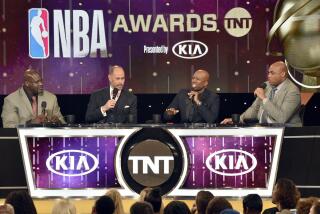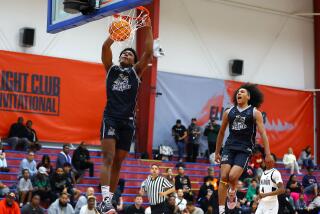Behind the bluster, Kenyon Martin has a heart
It figured to be one of those welcome to L.A. interviews, the scary, animated and intimidating tattoo that is Kenyon Martin saying, “Why don’t you put on your basketball shoes, come on the court and I will run right through you.”
I think that was after I said hello.
You hear about this thug now playing for the Clippers, the run-in he had with a radio guy in Denver, his suspension at halftime of a playoff game for getting into it with Denver Coach George Karl, and more Karl bashing this week.
Then, a few hours before Wednesday night’s game, you listen to the blowhard huff and puff about how he’s a man, he doesn’t care what anyone thinks of him and blah, blah, blah.
It’s a great show of bluster, and almost believable when he adds, “You tease me about that, and I’ll mess you up. I will fight you.”
But he’s stuttering as he says it, and while I would never tease him about stuttering, I just had no idea. I guess I was too intent on ducking if necessary, not noticing the occasional collision of words coming from Martin’s mouth.
A few minutes later he’s talking about how much he wants to help kids who might also be stutterers, and it’s almost scary how thoughtful he can be.
“If you’re a kid, it’s all you think about if you stutter,” Martin says. “Kids can be so mean. My grades suffered. Class participation weighs heavy in grading, and I wouldn’t open my mouth to read or talk in front of anyone.
“When kids would tease me, the way I would handle it, I would fight them.”
He went to the University of Cincinnati and did what he could to avoid being interviewed. It wasn’t easy for someone who would become the No. 1 player selected in the 2000 NBA draft.
But looking back now, whatever he’s accomplished on the basketball court, it’s hard to believe it’s any bigger than what he’s already done for so many off the court.
In addition to donating money to disaster victims across the country and his own foundation, which helps youngsters who do not have fathers, he works as a role model on behalf of various organizations for those who stutter.
How’s this for a headline? “Bad Guy Does Good.”
A few years ago he received an award from the American Institute for Stuttering, the blue crystal iceberg emblematic of the pain that runs beneath the surface for so many stutterers.
“I first met this kid, I think his name is Darius, and he couldn’t even get the words out,” says Martin, talking as soft and caring as a father might about his own children. “Then he went through a program, and here he’s the one who is presenting me with the award.
“And he didn’t stutter one time. How cool is that? It makes me so happy just thinking about it.”
Martin says he has learned how to control his breathing, which helps him not stutter. And he laughs when reminded how routine it is for him now to speak to large groups.
“I couldn’t even stand in front of 15 other kids in school,” he says.
So what would Martin, the tough-guy basketball player, do now if approached by a kid with a stuttering problem?
“I would sit there as long as it took for the kid to tell me all about it,” he says. “I’m going to sit there and be patient because that’s what my mom and sister did for me. So who am I to turn away from anyone who has that problem.”
And what would he tell the youngster?
“Go to school,” he says. “That’s who you are. Don’t let it control you. You can get help, but be who you are. It is part of you.”
Before going on to pretend he’s ready again to bite someone’s head off, he points to one of his many tattoos.
“Strength through adversity,” Martin says. “Stuttering is just one of the adversities I’ve had to overcome.”
He also had a set of lips from a former girlfriend tattooed to his neck, which he later had to obliterate. Adversity comes in all forms.
He’s had a lifetime of roadblocks. Tell him what he cannot do, but I wouldn’t suggest standing there and taking the charge.
“I have another tattoo here that reads: ‘God’s Plan, My will.’ That’s why I work so hard and care so much. Basketball is what got me out of the projects. It got my momma the house she never had, the car she never had.
“Nobody is going to get the best of me. You might score more points than me, but you’re going to know you were in a dogfight.”
But what about that ugly outside shot of his?
“That’s your opinion,” he snaps, the bluster back. “I don’t care about anything you have to say.
“I have feelings, but not when it comes to basketball. I’m here to win. I’m not here to make friends.”
I’d still hire him for my Halloween party, knowing as frightening as he might sound the mask is going to come off.
Just mention his kids. Divorced now, his two sons and a daughter live here, and they are the prime reasons he passed on an opportunity to start in Atlanta and chose to come off the bench with the Clippers.
“I didn’t have a father when I was growing up, and I vowed to be there with my kids,” he says. “Now I can pick my kids up from school or talk to their teachers.”
I presume he doesn’t wear the headband or the glare to school. He might even smile.
And while he doesn’t care, I wouldn’t be surprised to learn he smiles a lot.
More to Read
Go beyond the scoreboard
Get the latest on L.A.'s teams in the daily Sports Report newsletter.
You may occasionally receive promotional content from the Los Angeles Times.










